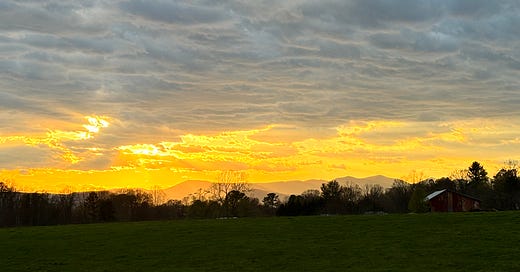An Unhinged History of American Publishing, Episode 5–Macmillan, or: where our mountains came from
Please open your Presbyterian hymnals to page 1843.
Just before the end of his long life, my grandfather told me a story.
(Yes, this is a post about the history of Macmillan, and no, I’m not a Macmillan heiress. Bear with me.)
Well, “told” is the wrong verb. My grandfather didn’t so much tell me this story as press it tenderly into my hands.
I was thrilled: a story?! It was rare for Dr. Alexander Erskine Sproul, 1916-2010, to talk much at all, let alone hold forth. Scion of Scots-Irish gentlemen, he was granite and austere as the Blue Ridge Mountains from which he came. He lived in Staunton, Virginia: the same place his ancestors had settled 250 years before, after leaving first Renfrewshire and then County Tyrone to practice their no-nonsense Presbyterianism in peace. Little had changed in the centuries since.
But anyway, onto the story.
“Anna,” my grandfather began. “They call my generation the Greatest Generation.”
I nodded; he’d been a flight surgeon in World War II.
“But we’re not,” he said.
I didn’t know where he was going with this, but the Calvinist self-effacement was no surprise. His 93 years had followed an Atticus Finch-like trajectory: the town obstetrician, he’d delivered every now middle-aged person in Augusta County and integrated the maternity wing at King’s Daughters Hospital. He was a lifelong church deacon. He’d served on the local school board and chamber of commerce. He’d also randomly led the effort to get the Shenandoah Valley its own airport. If you fly into SHD today, you’ll deplane at the Alexander Erskine Sproul Terminal.
My grandfather went on: “The real greatest generation was my grandfather’s. You see, after he came back from the war, he lost everything he had to the carpetbaggers. The land, the wealth, everything. The Yankees—” yes, he used this term unironically “—took it all.”
I didn’t say anything.
“My grandfather rebuilt his wealth from scratch in just ten years,” he said, eyes shining. “He did it without complaint, without self-pity, without…”—he paused, thinking of the right words—“…blaming the less fortunate.”
By which I think he meant “joining the KKK.”
“And THAT was the greatest generation,” he finished.
*
In a state archive somewhere, you can still find my great-great-grandfather Archibald Alexander Sproul’s pardon from Andrew Johnson. Never try to overthrow the federal government again, it basically says, and we’re cool.
I’m sure you already know where he got the workforce for all that remunerative farmland the carpetbaggers took away.
*
My grandfather went by the name Erskine. As is generally the case with families who can trace their lineage to the western lowlands of Scotland, there were already too many Alexanders by the time he arrived.
*
Alexander Macmillan, 1818-1896, was born in those same lowlands: specifically Irvine, a town about twenty minutes’ drive from where the Sproul name originated.
Like my grandfather, this Alexander was a taciturn, dutiful Presbyterian. Also like my grandfather, he was the youngest of many children in an agricultural family. Also also like my grandfather, he lost his father while still a young child.
To support the family, the oldest Macmillan brother, Malcolm, became a schoolmaster. Their farm days were done, more or less; it was just too hard to eke out a living that way. The younger Macmillan brothers followed suit in similar careers.
Daniel Macmillan, born 1813, was the first brother to go into bookselling. Frail his whole life, he was unsuited for much else. Malcolm introduced him to some bookish friends, and yadda, yadda, yadda: Daniel ended up opening his own bookstore in London.
Alexander eventually drifted down to join him. Like many booksellers of the age, they began publishing titles of their own.
*
In time, there was a scene change. After reading a religious tract he liked, Daniel struck up an epistolary friendship with the guy who wrote it, a wealthy Cambridge archdeacon. His new friend had an idea: why don’t you open a bookstore up near me!
Cambridge was a great place for wholesome Protestants to thrive, after all. A bastion of prudence and severity ever since the local MP, Oliver Cromwell, deposed the monarchy in the English civil war, Cambridge is to this day the more reserved and spartan of England’s two famous university towns. (There’s a reason “Saltburn” takes place at royalist Oxford.)
Daniel accepted the invitation. Alexander was supposed to stay in London and manage bookshop #1 while Daniel opened #2. Alas, however, Daniel was too tubercular at this point to handle a bookshop by himself. The brothers closed the London store and focused exclusively on Cambridge, where they became a beloved local institution.
Daniel and Alexander both married nice Presbyterian women and had a handful of nice Presbyterian children. After Daniel’s beat-up lungs finally wheezed their last in 1857, Alexander became paterfamilias to all.
*
Like the great Greek Alexander who lived before him, Alexander Macmillan had the will to conquer. Following Daniel’s death, he expanded Macmillan’s publishing operations dramatically, opening up a new office in London, then the United States, then Canada and Australia and India. In other words, he made himself an empire.
Keep reading with a 7-day free trial
Subscribe to How to Glow in the Dark to keep reading this post and get 7 days of free access to the full post archives.



